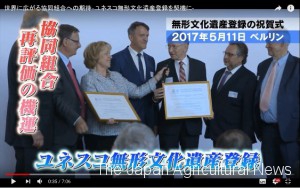
A photo shows a video created by Japan’s agricultural cooperatives group to highlight the roles of cooperatives.
TOKYO, Oct. 19 – Japan’s agricultural cooperatives group has released online a video in Japanese to promote the idea and practice of cooperatives which was added to the list of UNESCO’s Intangible Cultural Heritage in November.
The seven-minute video highlights the history of cooperative movement, including how it was first established in Germany, how it spread worldwide and the role it plays in the current society, quoting German officials who submitted the idea of cooperatives for UNESCO nomination.
According to the video, Friedrich Wilhelm Raiffeisen, known as the founding father of Germany’s cooperative movement, established a credit society to support rural farmers who were often subject to exploitative loan shark practices. The initiative, in which members’ deposits served to provide loans for other members, turned out to be the oldest form of cooperative, the video says.
In the video, Christoph Wulf, vice president of the German UNESCO Commission, points out that cooperatives raise an alarm over excessive capitalism and neoliberalism, and show there are important things in life besides personal success.
The video also says cooperatives are expected to play a significant role in achieving the United Nations’ Sustainable Development Goals.
The Central Union of Agricultural Cooperatives (JA-ZENCHU) officials who created the video from footages taken in Germany said they hope the video will be used by people to learn about cooperatives. The video can be viewed on YouTube or on JA-ZENCHU’s website.

